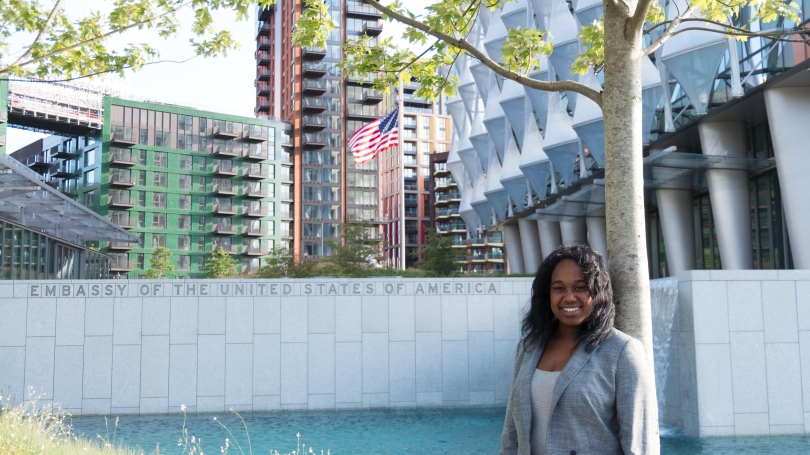
- Public Policy
- Leadership
- Funding
- News & Events
- About the Center
Back to Top Nav
Back to Top Nav
Back to Top Nav
Back to Top Nav
Natalia McLaren '20 interned at United States Embassy London during the 2019 summer term.
This past summer I interned at United States Embassy London. Here, I learned a great deal about my life, my country, and the world we all share. At the embassy, I attended meetings and created summaries, read cables regarding the U.S./UK relationship with a number of different countries, and wrote briefings, talking points, and backgrounders for the Ambassador. Working and interacting with diplomats taught me how to be polite but persuasive in my speech, flexible when appropriate yet headstrong when necessary.
While at the embassy, my main tasks almost always included writing clearly and concisely, which has always been a challenge for me as someone who aims to write a novel. However, I feel my writing improved immensely through this process. Although I strive to develop my writing skills further, the ability to continue to explore myself and the world around me excites me. When writing for briefing memos and backgrounders, one must not only be concise, but tell a story. Finding the juxtaposition between concision and creativity is something of which I still struggle but have a better grasp on how to accomplish. As I oscillate between writing for government, English, creative writing, and psychology--all included in my double major--I discovered that the structure for each paper/story is less different than many may believe. As I previously alluded to, the foreign service officers invited me to meetings regarding a range of topics. Attending meetings allowed me to learn about various countries within the global arena, as well as meet officials, ministers, ambassadors, and people highly accomplished in their fields. Through these meetings, I was able to build my network and learn to interact in ways that are diplomatic and kind.
Creating a Middle East Notebook also positively added to my experience at Embassy London. I compiled a notebook with fast facts of Middle Eastern countries including their capitals, languages, and populations, as well as their relationship with the United States and the United Kingdom. Through this project, I found myself more familiar with Middle Eastern countries, and able to speak about topics I previously knew very little to nothing about. My knowledge expanded by researching these topics. Finally, interacting with the interns, summer hires, diplomats, and other officials at the Embassy positively impacted my time at the embassy. Everyone was willing to get coffee and chat or go for lunch and learn more about each other. Even Ambassador Johnson and the Deputy Chief of Mission Yael Lempert took the time to meet and speak with the interns and held conversations with us when we passed them in the halls. I feel that this fostered an amiable environment that made going to work enjoyable each day. I felt comfortable speaking with my supervisors and finding solutions. I truly felt like the embassy was a home. I cannot stress enough how well everyone was treated, and although I was an intern in the office and only temporarily a part of the team, I was still well respected and treated with dignity no matter my status. This drove me to work harder and do better as I felt that I could ask questions and feel confident about the work I was doing.
I appreciated this challenge as a way to prioritize and manage my time in ways to maximize my experience. Rockefeller Center programs contributed greatly to my experience at Embassy London. I participated in the Management and Leadership Development program my sophomore winter, which taught me how to communicate better with supervisors, as well as write clear, concise, and informative emails to officers. The grant I received from the Rockefeller Center and the Class of 1981 not only provided funding for my internship, but also aided in my understanding of the workplace and how to conduct myself within it through the pre-internship orientation. Interning in the U.S. Embassy in London solidified my interest in the international arena, as well as in government and writing. With an enhanced understanding of global affairs and an improved ability to write clearly and concisely, I feel better equipped to speak about and analyze topics affecting the United States, the United Kingdom, and a number of other countries in the world, and I’d like to thank the Rockefeller Center for granting me this opportunity.
The Rockefeller Internships Program has funding for Dartmouth undergraduate students to help defray the cost of living expenses associated with a full-time, unpaid, leave-term internships in the fields of public policy, public affairs, and social entrepreneurship.